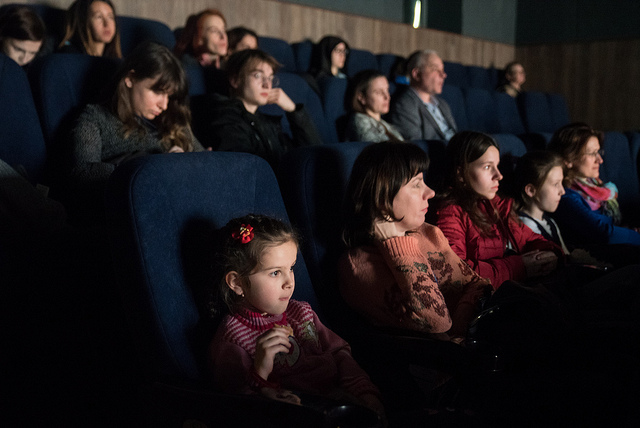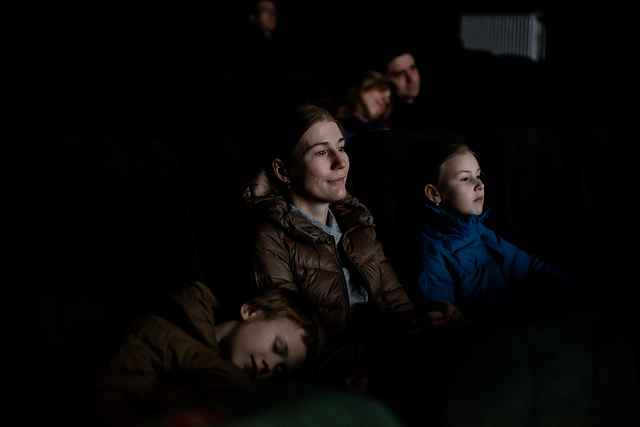The club introduces schoolchildren to the best documentaries from around the world, and after the screenings, they discuss the issues raised in the films. Moreover, teachers note that the films can also be used as visuals when studying the school program. Photo: Oksana Gil Oksana Gil, assistant principal for educational work and moderator of the school film club, has been successfully integrating documentaries into learning school subjects for two years. She has developed a methodology for using films from the DOCU/CLUB Network's collection in physics, chemistry, geography and other classes. Oksana Gil shared her experience of using documentary films in the curriculum with her fellow teachers during a meeting of the methodological association of chemistry teachers held at the school. “For a long time, I’ve had an idea of integrating documentary films into the process of learning various disciplines. I started working on developing this idea before the full-scale war, making my first attempts to use documentaries to teach school subjects in my Ukrainian language and literature classes. For example, when my students and I were studying the formatting of quotes or the formatting of dialogues, I used to take cues from documentaries for practical exercises. Then, I started looking for films whose themes were related to topics in Ukrainian history, world history, geography, and health basics. Science teachers have always been the most active enthusiasts of such events. They were happy to invite my film club to their classes. At our school, lessons are double: in the first lesson, the teacher explains the topic according to the program, and in the second lesson, I show the film and discuss it with the students. In fact, we work side by side with the subject teachers. It is important for me to share my experience and best practices with my fellow educators. At the Ternopil school No. 28, where I work, a meeting of the methodological association of chemistry teachers was recently held, which was attended by 18 participants. At this meeting, the teachers discussed educating on the topic of healthy lifestyles and the harmful effects of alcohol on the human body.” Photo from the archive of the NGO Docudays UA “We talk to students about a healthy lifestyle: who is a healthy person, how they should live, what they should eat. We discuss the components of a healthy lifestyle and sports, talk about the dangers of drinking alcohol, and so on. These topics are included in the chemistry curriculum, and they are also taught in health education classes in the 7th, 8th, and senior grades. At the meeting of the methodological association, I’ve demonstrated how to make these lessons more interesting by showing a thematic documentary. The teachers watched the film “Scrap Metal” directed by Dmytro Hlukhenkyi. This is a story about a man who exists between the edge of the abyss of alcoholism and enlightenment. Fenik, the protagonist of the film, found a way to survive by collecting scrap metal. As long as he has enough scrap metal, he is quite happy. I am convinced that this documentary story is organically intertwined with the important topic of deteriorating consequences of an unhealthy lifestyle and the benefits of a responsible attitude to health, which determines the chance of choosing an interesting profession, the realization of one's abilities, and, consequently, financial success. The film prompts us to think about what makes a person happy. The viewers come to the conclusion that alcohol and drugs are not the way to experience truly profound happiness. The documentary helps the teacher to bring students to a deeper level of analysis by discussing the protagonist's fate and actions, to think about the meaning of happiness and its true, undistorted models. After all, our task as teachers is to create in the minds of our students an image of a happy, successful person who leads a healthy lifestyle, does not abuse alcohol, and truly understands his or her social value and importance in society. Photo from the archive of the NGO Docudays UA The teachers were impressed with the way this documentary helped them start discussing such a deep problem. We discussed human rights violations using the main character as an example. The teachers shared situations from their own experience and discussed how they could help students if their rights were violated. Since the meeting was attended by chemistry teachers, they also pointed out that the film “Scrap Metal” could be shown in chemistry classes as a visual aid when studying metals. After a discussion based on the film, they worked together to write chemistry exercises for the students. I was able to demonstrate how one can explain to students the importance of a healthy lifestyle while discussing human rights. After all, this conversation is an indispensable part of all meetings at the Docudays UA film clubs. Many of the teachers at the meeting were introduced to this worktool for the first time. It was interesting to observe them getting involved into discussion. The documentary helped make the lesson much deeper and more interesting. And this is crucial nowadays, as teachers are looking for new approaches to presenting information in class. At the end of the meeting, my colleagues with vast experience in school education came up to me and told me about their interest in this form of work. In their opinion, the film club event is the highlight that allows one to fill the lesson not only with knowledge but also with emotions. I was very pleased with such reaction from my colleagues. I am convinced that this meeting was the impetus for such methodological unions to actually unite and inspire those teachers who care about the quality of the educational process. I dream that Docudays UA film clubs will open in every school. I am ready to help teachers fill out applications for opening a film club, as well as share my life hacks on how to hold a successful event, interest students, and respond to possible “uncomfortable” questions. I am currently preparing a manual with recommended films for each discipline in the curriculum. Before the full-scale war, I’d summarized some experience and shared it with the DOCU/CLUB Network team. I approached teachers of biology, geography, civic education, and history, asking them about specific topics from the curriculum and selecting films related to these topics from the Network's collection. We used to hold joint screenings in the classroom. For example, in a geography lesson, students were studying the geographical map of the south of Ukraine. I showed them the films “Crimea SOS” by Serhiy Lysenko or “Jamala's Struggle” by Swedish filmmaker Elin Jonsson. With these films, one can show students the landscape of Crimea, the Crimean Mountains, and the settlements of the Crimean Tartars. All of this is done through the special stories of the film's characters, which captivate students and hold their attention. Photo from the archive of the NGO Docudays UA Recently, I had an interesting screening with a Polish language teacher. The DOCU/CLUB Network's film collection includes the film “Tomek B” by the Polish director Anna Więckowska. This film was screened in Polish with Ukrainian subtitles. In the classroom, the Polish teacher was analyzing the main character's vocabulary. The children were looking for dialectisms, checking them in the dictionary. And I talked to the students about the violation of the rights of the 12-year-old protagonist of the film. It is noteworthy that the entire discussion was held in Polish. I must say that such lessons are always popular among students. I often hear from them: “We never thought that a geography or biology lesson could be so interesting!” This is exactly the goal I strive for: to interest students in the non-standard format of the lesson, “engaging” them more deeply in its topic. After all, one remembers theoretical material better when it is presented in such an unusual way. In addition, thanks to the film club, we achieve an even deeper goal: our students understand how society works and how they should build their lives after graduation. Therefore, it is necessary to give them not only theoretical knowledge of the subjects, but also practical skills in understanding human rights and the ability to recognize and protect them if necessary. I believe this is my main mission.” The development of the DOCU/CLUB Network is funded by the United States Agency for International Development (USAID), the Embassy of Sweden in Ukraine, the National Endowment for Democracy (NED) and Fondation de France. The opinions, conclusions, or recommendations are those of the authors and compilers of this publication and do not necessarily reflect the views of the governments or charitable organizations of these countries. The authors and compilers are solely responsible for the content of this publication.



DOCUMENTARY FILMS IN SCHOOL EDUCATION PROCESS: INTEGRATION EXPERIENCE FROM A TEACHER IN TERNOPIL
04 December 2023
Teaching students to understand human rights, raising them to be active citizens, and explaining how to protect their own rights and respect the rights of others are important components of the educational process. In Ternopil School #28, a human rights documentary film club, which is part of the DOCU/CLUB Network, has been helping to achieve these goals for 5 years now. Reprinted from the “New Ukrainian School” website.
